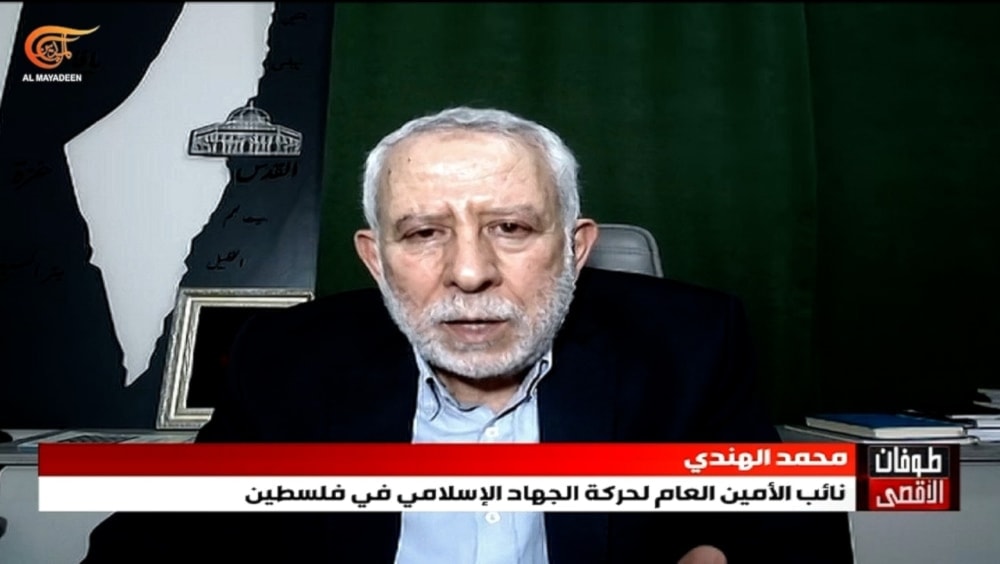'Israel' seeking to displace Gazans: PIJ Deputy Chief to Al Mayadeen
The PIJ's deputy chief warns that threatening with an aggression against Rafah will lead to dire consequences if it is not met with a decisive rejection from Cairo.
-

The Deputy Secretary-General of the Palestinian Islamic Jihad (PIJ) movement, Mohammad al-Hindi.
The Deputy Secretary-General of the Palestinian Islamic Jihad (PIJ) movement, Mohammad al-Hindi, said Tuesday that the quadripartite meeting held in Cairo, in the presence of representatives of the United States, Qatar, Egypt, and the Israeli occupation, is similar to the first Paris meeting.
In an interview for Al Mayadeen, al-Hindi noted that the participation of an Israeli delegation in the negotiations aims to "calm the anger of the families of the Israeli captive," noting that "gaps in the negotiations still exist, awaiting what the mediators report on the Israeli position."
He pointed out that "the problem with the Israelis is that they want to shorten the duration of the truce to a month or less, without providing any guarantees," stressing that what is required is "a sustainable ceasefire that includes allowing the return of the displaced" to their homes.
The Palestinian official described Egypt's role in the negotiations as "positive", pointing out that it is capable of "obstructing Israeli ambitions."
Al-Hindi mentioned that "Israel" seeks to displace Palestinians, noting that it refuses to allow the return of the displaced from the south of the Gaza Strip to its north.
The Deputy Secretary-General of the PIJ considered that when US President Joe Biden talked about a humanitarian corridor for the displaced, "he meant displacement to Sinai," warning that the danger of displacement will not be limited to Gaza, but will include the entire region.
Touching on the looming Israeli plan to invade Rafah, al-Hindi described the bravado of Israeli occupation Prime Minister Benjamin Netanyahu and his talk of a "decisive victory" are "worthless", warning that threatening with an aggression against Rafah will lead to dire consequences if it is not met with a decisive rejection from Cairo.
In the same context, the Palestinian official pointed out that "Israel" wants to control the Rafah crossing, because all aid entering Gaza is inspected in "Kerem Shalom", adding that the Israeli occupation entity wants to replace the Rafah crossing with the "Kerem Shalom" crossing.
Regarding the occupied West Bank, al-Hindi mentioned that "Israel is exhausted," highlighting that more than a third of the occupation army is mobilized there due to operations carried out by the Palestinian Resistance.
He made it clear the West Bank is "fighting a real battle," adding that the Israeli occupation is using aircraft during operations against the Resistance fighters.
As for the fronts supporting the Palestinian Resistance, the senior PIJ official emphasized that "the Lebanese front is important and Israel is exhausted in it," adding that "more than 100,000 Israeli settlers have left their homes fearing the resistance’s rockets."
According to al-Hindi, "the decision for war in the north is not in the hands of Netanyahu and his government, but rather requires American approval."
Al-Hindi concluded by stressing that the Yemeni front is "very important because the Red Sea is a global trade corridor." He added that the Palestinian Resistance was not surprised by Yemen's decision to take part in the battle.
Read more: Gaza Resistance surprises IOF with blowing up tunnels, buildings

 3 Min Read
3 Min Read








